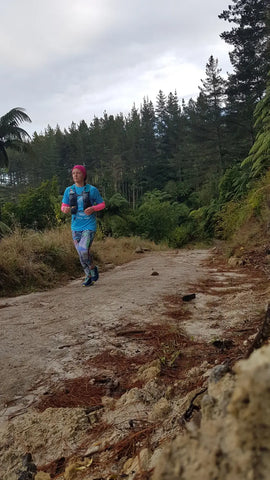Six weeks before I ran the Taupo 100km in 2018, I hurt my knee in a training run. After finishing a marathon one Saturday, I went for a slow trot around the streets to bank in some k's while fatigued, but hit the path funny and found myself close to tears with the pain. I spent the next 6 weeks going to physio and avoiding running altogether. I had to trust in the training I had already done, trust that I had trained my brain to cope with the mental and physical fatigue and believe I was entirely capable. After the necessary restrictions, I managed to run the event pain free.

This week, I decided to get in early and head to the physio BEFORE I risk getting injured. He gave me a bunch of exercises to work on to strengthen knees and ankles - one of which involved balance.
He had me stand on one foot with my eyes open, then try it with my eyes closed. After this he had me continue balancing on the one foot, eyes closed, but shaking my head at the same time. It's not easy!
The idea of balance though had me thinking two things. Firstly, the importance of finding balance in commitment and second, finding the right balance of input.
Balance of commitment: I am realising how important it is to find the balance between my training and my other commitments - family, friends, work, sleep! The other day when a friend asks us if we want to go mountain biking as a family...I say I will run and they can bike. My husband jokes how it's not all about me and my running (he may not have been joking?) but really, sometimes I am so committed to the training that I think it is all about me. I'm a creature of routine and habits so when my routine gets changed, I have to learn quickly to adapt or I am the one that suffers. It reminds me of the circus act where the clown spins plates on sticks, adding more and more plates and trying to keep them all spinning so none of them drop and break. Finding a balance between all our commitments can be hard if we've don't prioritise what is important and communicate that with the right people.
I love that right now my kids know what I'm training for and the level of commitment it takes to get there - it gives us all an opportunity to learn and teach each other about balance and commitment. I know that things are unbalanced when the kids all start hounding me for quality time when I'm completely spent lying on the floor - thankfully something an easy board game can fix and bring things back level again.
This is where find the importance of balancing our input comes in. What plates am I spinning and what am I putting on those plates? What things am I allowing to influence me during this season of training and what things can I discard. Who am I letting into this space, who is helping keep the support system going and who is not contributing? What am I reading that is helpful and encouraging, and can I read more of that which will influence my training and less scrolling through social media? We can't do many things with a poor support system because we weren't meant to always do things on our own or in our own strength. Only I can control what I allow as 'input' - but I also need to find the healthy balance.
If we don't have balance, everything falls over. No matter how many plates are spinning, or how well our books are stacked that we're carrying, or if only one part of our body breaks down- each part affects the other. Just like we learn to balance and build the strength in our legs before we learn to walk, we also need to take the time to learn what things will be beneficial and what will be detrimental to our goals.
As I focus on strengthening the parts of my body that have broken down before in order to save myself from pain later, we can do the same in life - strengthen the areas that need it, get the right input and the right systems, and boost up the healthy knowledge and encouragement and let go of the things that fail to contribute to a better outcome. It's okay to take responsibility for ourselves - it also gives others permission to do the same.

